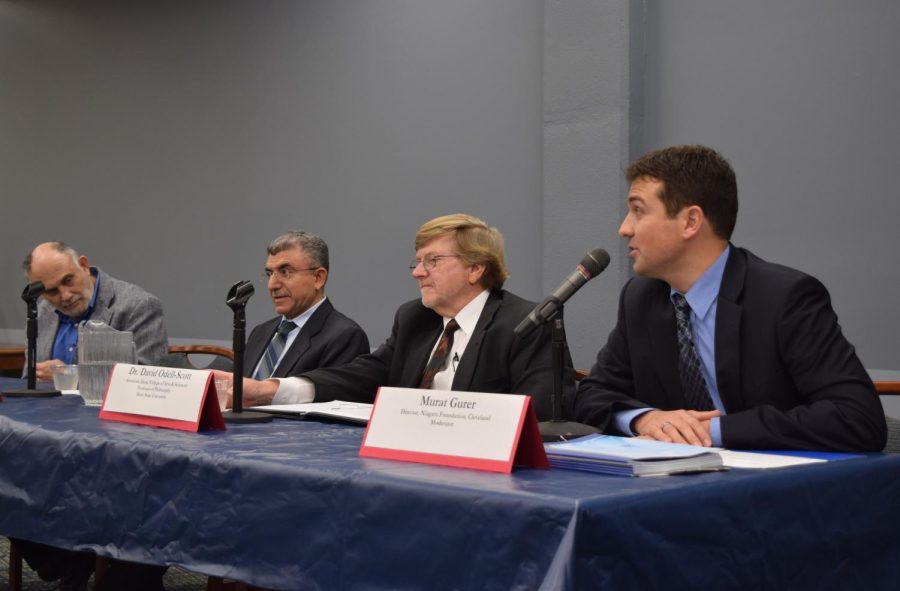University library hosts night to unify religion leaders
The moderator and panel hosts start the evening off with talk on religious backgrounds at a Respect for Sacred vs Freedom of Speech event on Wednesday, Nov. 4, 2015.
The Kent State University Library hosted its “Respect for Sacred vs. Freedom of Speech” event Wednesday from 6-8 p.m.
“This talk is like a tango: It always takes two,” said Peter Haas, Abba Silver Hillel professor of jewish studies at Case Western University.
The night served to unify believers of Islam, Judaism and Christianity. Moderator Murat Gurer said the goal was to “explore freedom of expression.”
The panel consisted of three individuals: Haas; Zeki Saritoprak, director of the Bediuzzaman Said Nursi Chair in Islamic Studies at John Carroll University; and David Odell-Scott, associate dean in the College of Arts & Sciences and professor of philosophy at Kent State.
The men began the evening with an explanation of their belief systems and then moved to answering questions provided by Gurer. Most of the questions revolved around the topic of civility toward differing religions.
“When we attack other people’s sacred items, we are not only attacking God, but in some ways, we are attacking what we are,” Haas said.
Panelists recognized that although Christianity is the predominant faith in America, other faiths are present in the country and even on this campus.
In a study done by Pew Research Center in 2014, 70.6 percent of America identified with Christianity and 5.9 percent identified with a non-Christian faith.
Odell-Scott, who classifies as a Christian, acknowledged camaraderie with his fellow panelists of different faith traditions.
“I’m looking for a greater humanity and I find it with my friends here,” he said. “We enjoy talking and trying to understand one another. Tolerance is not a virtue.”
Gurer asked the speakers about offensive statements against certain religions, and Saritoprak cited the cartoons of the Prophet Muhammad as being negative depictions of his faith.
“Free speech is a gift and it is often really misused,” Haas said. “There’s no problem with being critical, but we can be critical in a way that is informed and polite.”
He acknowledged that all three men come from complex traditions that are unable to be criticized without proper knowledge.
“The psychology of the mob is not necessarily always using the frontal lobe,” said Odell-Scott.
The panel was open to questions for the final 45 minutes, where audience members asked about topics ranging from a religion’s influence on people to a future in unity.
Saritoprak said it is impossible to completely end divisive human behavior. Additionally, Odell-Scott shared his insight on why this behavior is present.
“We are so insignificant,” he said. “When we attack other peoples’ understanding of the revelation, we are putting ourselves too high.”
The night ended with remarks from panelists and Gurer, urging audience members to act with civility towards members of differing faith.
Roman Panchyshyn, catalog librarian and assistant professor, was impressed with the turnout of the event.
“It was an interesting discussion by all three of the panelists,” he said. “The biggest thing for me was the interest people showed.”
Denise Harrison, a Kent State English lecturer, enjoyed the event.
“There was wonderful representation from different communities,” she said. “I like the idea of ‘don’t harm people, don’t incite violence, we are human beings.’”
Kelly Powell is the religion reporter for The Kent Stater. Contact her at [email protected].



